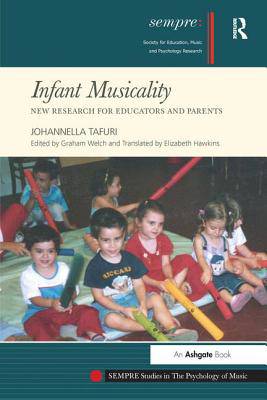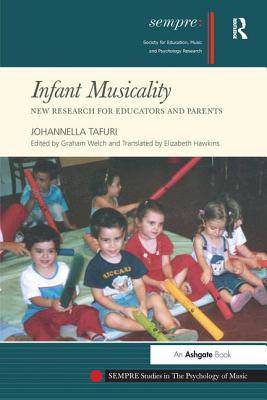
En raison d'une grêve chez bpost, votre commande pourrait être retardée. Vous avez besoin d’un livre rapidement ? Nos magasins vous accueillent à bras ouverts !
- Retrait gratuit dans votre magasin Club
- 7.000.000 titres dans notre catalogue
- Payer en toute sécurité
- Toujours un magasin près de chez vous
En raison de la grêve chez bpost, votre commande pourrait être retardée. Vous avez besoin d’un livre rapidement ? Nos magasins vous accueillent à bras ouverts !
- Retrait gratuit dans votre magasin Club
- 7.000.0000 titres dans notre catalogue
- Payer en toute sécurité
- Toujours un magasin près de chez vous
Infant Musicality
New Research for Educators and Parents
Johannella Tafuri, Elizabeth Hawkins, Graham Welch
35,45 €
+ 70 points
Format
Description
What can infants hear? What are their reactions to music? Is it useful for them to sing and listen to music? Is their auditory sensitivity developed before their birth? At what age do they start singing, and clapping their hands? How can their musical development be improved? These (and other) questions are present in today's debate on music education and the responses are normally given in an intuitive way. It is now necessary and urgent to sketch a developmental profile of infants, starting from their earliest manifestations. In the last 30 years, research in this field has been progressively developed. In most cases research has been devoted to single aspects of more complex problems. Moreover, it has been based on non-homogeneous categories of subjects and by different methods. Motivated by the fact that many open problems need to be solved, Professor Tafuri decided, in 1998, to begin a longitudinal research project devoted to studying the musical development in children from 0 to 6 years, with particular attention on the ability to sing in tune. During these 6 years, the children would have a regular music education experience with their mothers and often other members of the immediate family. This book has two main areas of focus. The first reconstructs the development of human musical abilities. Tafuri systematically reports studies of the development of vocal, rhythmic and motor abilities through the observation of the same participants for three years, beginning with the mothers' experiences in the last three months of pre-natal life. The programme of musical activities and the modalities of the collaboration with the parents are described. The second area of focus puts forward an educational perspective based on the results of the research. The amount and the quality of the collected data can allow parents and educators to plan different activities by considering the starting point for individual participants and the development of their musical abilities. The long-term aim is to reach an overarching understanding of the personal musicality of each subject. The book will be of crucial interest to parents and nursery/kindergarten educators so that they can have scientific, theoretical and methodological foundations for their educational strategies, as well as being of considerable interest to all musical educators, irrespective of the age of their pupils: a good knowledge of the first stages of musical development can permit a better evaluation and a fulfilment of later educational needs in music.
Spécifications
Parties prenantes
- Auteur(s) :
- Editeur:
Contenu
- Nombre de pages :
- 212
- Langue:
- Anglais
- Collection :
Caractéristiques
- EAN:
- 9780754665120
- Date de parution :
- 16-02-09
- Format:
- Livre broché
- Format numérique:
- Trade paperback (VS)
- Dimensions :
- 156 mm x 234 mm
- Poids :
- 303 g

Les avis
Nous publions uniquement les avis qui respectent les conditions requises. Consultez nos conditions pour les avis.






